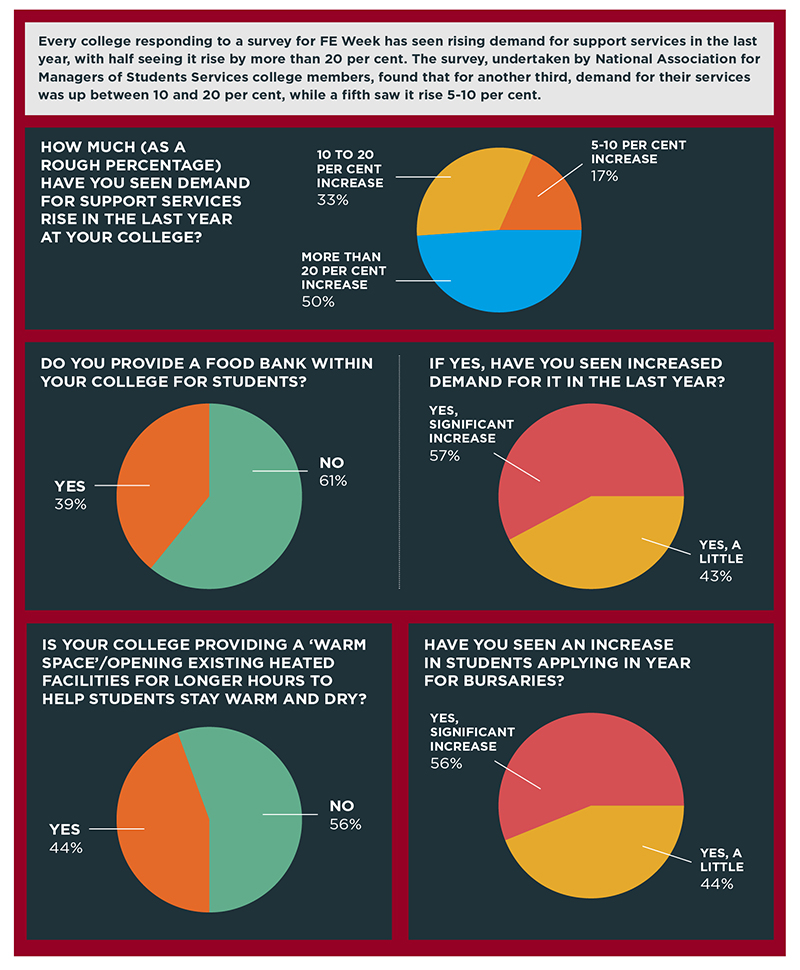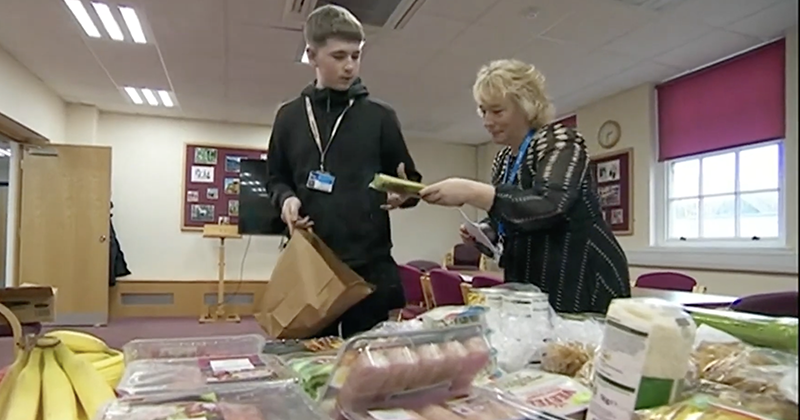Josh was a talented bricklaying student with dreams of running his own building firm. Then his mother lost one of her part-time jobs, forcing them to request financial support from his school, Hartlepool College of Further Education. Josh – not his real name – got a part-time cash-in-hand job and, after his attendance started waning and he struggled to focus at college, he dropped out altogether.
Hartlepool’s principal, Darren Hankey, says colleges across the country are dealing with students like Josh daily, a claim backed up by our investigation showing how more students have quit college since the cost of living crisis began, with support staff feeling “overwhelmed” amid spiralling demand for their services.
Soaring demand for support
Every one of the 18 colleges responding to a survey for FE Week by the National Association for Managers of Students Services saw demand for their support services rise in the last year, with half seeing demand increase by more than 20 per cent.
Growing demand is piling more pressure on overstretched staff and student welfare budgets. Only 2 of the 63 colleges (3 per cent) that responded to an FE Week freedom of information request saidthey were planning to increase their student services budgets this financial year, with the same percentage cutting the resource and the rest maintaining it for now.
Eddie Playfair, senior policy manager at the Association of Colleges, says colleges are reporting a “massive growth in demand” for support which they are “struggling to keep up with”.
“Whether it’s mental health or financial support, they haven’t been able to grow their support in proportion to rising need,” Playfair said.
Lisa Humphries, the new chair of the National Association for Managers of Student Services (NAMSS), says support services are overwhelmed and believes demand has “tripled, if not more” over the past four years at her members’ colleges.
She points out that the cost of living crisis is just one of several calamities to hit this generation of young people.
“It is the year-on-year build-up of the impacts of the pandemic and mental health issues. We literally have to ask ourselves each day, what support can we put in place that is going to have the most impact?”

Rise in drop-outs
More students have dropped out of college since the cost of living crisis began, with five times more students blaming the decision to quit on money worries, our FOI responses show. So far in this academic year, 7 per cent of students have withdrawn. The overall figure was 9 percent last year, and 7 per cent in both 2020-21 and 2019-20.
But 5 per cent of students quitting this year said that they left for financial reasons, compared with 1 per cent in 2021-22 and 2 per cent in 2020-21.
A higher share of those quitting their courses cite getting a job as their main reason: 12 per cent since September and 14 per cent last academic year, compared with 10 per cent in 2020-21 and the preceding year.
Weston College noted some learners withdrawing from its trade provisions because of the “lure of high hourly wages and the increased demand for low-skilled labour”, while Blackpool and The Fylde College told FE Week that many of its students were missing classes due to second jobs.
Hankey is concerned that the rise in students dropping out to work “bakes in inequality”. He says: “It is nearly always in precarious work – zero-hour contracts with no guaranteed income from one week to the next. Ultimately, this is a waste of talent and, I’d imagine, a practice solely taken up by those from poorer backgrounds.”
Universal Credit and Child Benefit rates rise by just over 10 per cent from April, providing some reprieve for cash-strapped families. But it will be too late for Josh.
“The current circumstances have deprived the economy of someone who has had the opportunity to make a greater impact snatched away,” Hankey says.

More bursaries for struggling families
The impact of the cost of living is also evident when it comes to demand for bursaries, with all of NAMSS’s survey respondents seeing a rise in uptake in the past year, and 61 per cent calling the increase “significant”.
Amid soaring inflation, some commented that they were having to increase the household income eligibility threshold to support struggling students and families.
Whereas usually about 60 per cent of Hartlepool’s students apply for funding in any academic year, this year 95 per cent applied, with extra demand coming from students in households where parents are working, Hankey says.
This places “extra burdens” on the college in supporting students and processing bursary applications.
Humphries, who is also associate principal for students at the Chichester College Group of seven colleges, says that normally their students would apply for financial support at the start of their course. This year they have seen around a 10 per cent increase in students “suddenly in financial hardship” applying for bursaries mid-year.
Hartlepool usually uses the government bursary funding for the essentials such as students’ travel to and from college, food, and key curriculum kit, while trying to keep some back for “enrichment activities” for poorer students such as visits to businesses which “can be invaluable”.
But the escalating demand means Hartlepool might have to limit these activities, or not offer them at all.
Playfair says the £90 million government funding that colleges receive for bursaries is insufficient. “Colleges are spending their bursary fund and having to make difficult decisions. Some colleges talk about using other funds to shore up hardship – they’re spending more on transport or food than the allocation they get from government,” he says.
Filling the food gap
Although some students’ families receive Universal Credit, they are often below the threshold for free meals. But colleges are stepping in to fill the gap.
Thirty-nine per cent of NAMSS respondents now provide a foodbank within their college, all of which have seen increased demand, and half of which have seen a significant increase.
Others have established strong links with local foodbanks.
Playfair says that “many, many more cases of students are relying on colleges for all their main meals, and coming into college even if they haven’t got classes because of that”.
Colleges providing foodbanks on campus include City College Plymouth, Abingdon & Witney College and Newark College, which has seen a 60 per cent rise in usage in the past year. Newark also provides free breakfasts every day for students and staff, and food bags of ingredients to take home and cook.
One student there described how she usually only eats when she is at college three days a week, and the food bags, which each contain a recipe card for students to learn how to cook healthy meals, is “something to look forward to and [a chance] to eat properly”.

How councils are helping – or not
In some cases, local authorities have stepped in to provide extra support.
Tower Hamlets has been the most generous, earmarking £500,000 this year to re-introduce a version of the Education Maintenance Allowance (EMA), scrapped in England in 2011, to support poorer 16-19-year-old students from its borough.
The council received 1,921 eligible applications for the £400 payment this year.
Playfair believes now would be a good moment for the government to revisit the idea of reintroducing the EMA in England, which is the only part of the UK not to have it.
“As an anti-poverty strategy, it would pump some money into very hard-pressed local economies,” he says.
Some councils have used the household support funding from government, designed to support vulnerable households, to provide meals for college students during the holidays.
But Playfair describes provision as a “postcode lottery”, with some learners receiving food vouchers while others attending the same college but from a different council area go without.
With fuel costs rising, Playfair says some councils are struggling to subsidise students’ public transport fares, so some colleges have stepped in to run them instead.
Weston College offers all learners “50 per cent plus” subsidised bus travel via First Bus, as well as providing its own “bespoke transport services”. But it has still seen some learners quitting “due to the removal of a small number of local bus services by the local authority”.
South Essex College has made Friday a self-directed study day, so that learners can save on transport costs.

How the crisis is affecting attendance
For those students who do make it to class, some colleges are finding they are staying on campus for longer because of the free food and warmth on offer.
The NAMSS survey shows that 44 per cent of colleges provide a warm space or open existing heated facilities for longer hours to help students. Even among those colleges who do not, several said that they had accommodated students on non-timetabled days, and that they had generally seen students generally staying at college longer than in the past.
Penny Taylor, head of Newark College, says that since introducing a daily free breakfast club for students and staff, the college has seen a rise in “attendance, retention and punctuality”.
But it’s a mixed picture. Humphries says Chichester’s seven colleges are all seeing drops in attendance as students are forced to work to support their families or take on more caring responsibilities for younger siblings to allow parents to work more.
Like many colleges, Chichester has extended its opening hours for its warm spaces, after seeing more students “hanging around in canteens and common rooms for longer”, says Humphries. “Part of that is because maybe they’re not getting heating at home, or parents are working longer hours and they don’t want to be on their own at home.”
But she warns of the difficulty in paying for staffing costs to cover extended hours, and of colleges’ own rising energy bills.
Of all the colleges that responded to our FOI, the City of Liverpool College reported the highest proportion of drop-outs this year at 17.5 per cent. But it is also taking concerted action to support learners.
Its head of student services. Amanda Parker, says that as “more and more students are working part or even full-time jobs alongside their studies”, the college has adapted timetables as well as keeping its nursery provision and libraries open later. It provides free breakfasts and has expanded free meals to its adult cohort across the week.
Basingstoke College of Technology is responding to rising demand by organising more food parcels, helping students apply to charitable organisations and accompanying them to citizens’ advice meetings.
Playfair believes that going to college is seen as “part of the solution” to the crisis for many learners. “The college becomes more important in their lives because of the support it offers.”


















This is a massive problem and I’m so pleased to finally see some spotlight on the poverty conditions our students are facing. Just yesterday I had a call with a parent of one of my level 3 students who wanted to know how her daughter could continue the course as she has to up her hours at work to help with household bills. Bursary fund does not scratch the surface and if I offer too much online learning Ofsted will mark us down. It’s no wonder students are dropping out.
As a student with an eating disorder, the cost of living crisis has been a constant source of stress. I get terrible chilblains that lead to open wounds in winter, but I couldn’t afford to heat my room so I spent the whole of winter with sores on my fingers and toes. Now bills are going up, and I’m having to spend less on food. I had managed to start recovering at the start of the academic year, but the stress of prices rising has pushed me to relapse, especially since spending less on food means I can shower more than three times a week. It feels so out of my control.